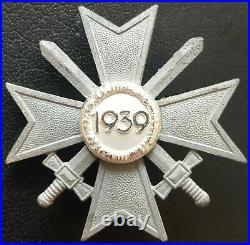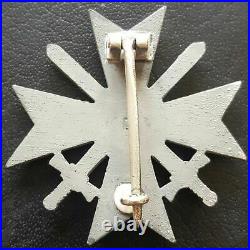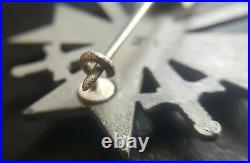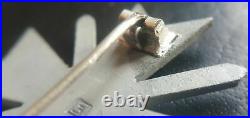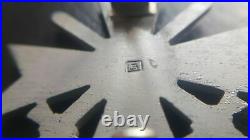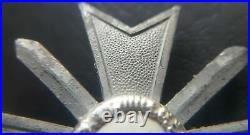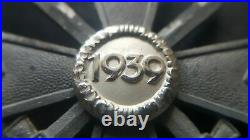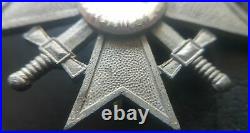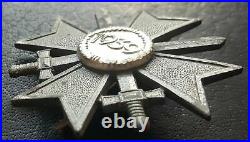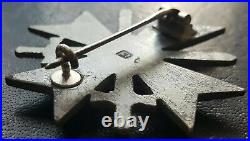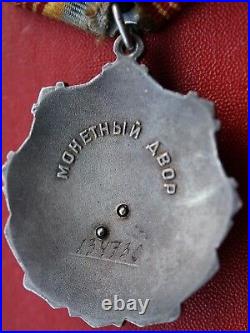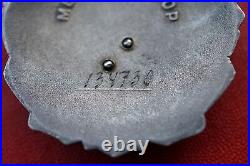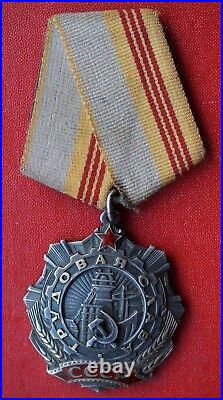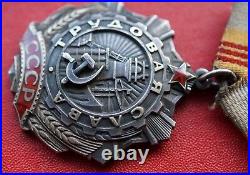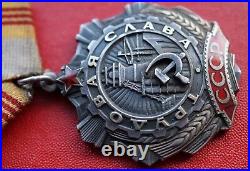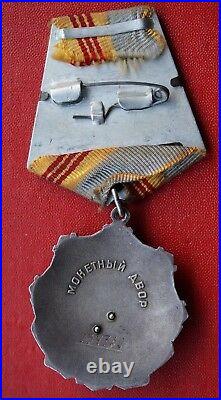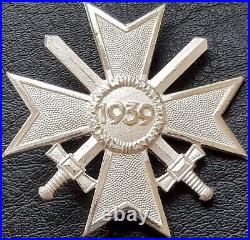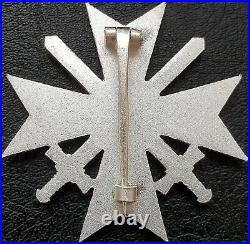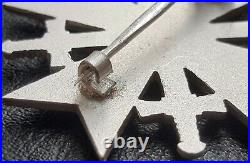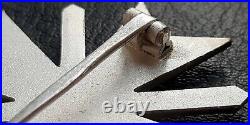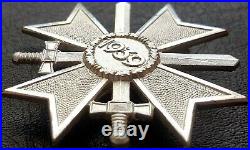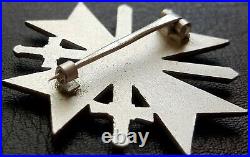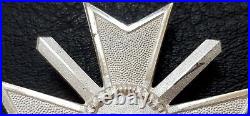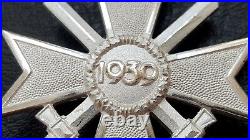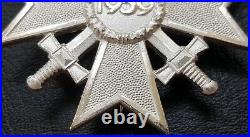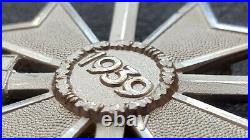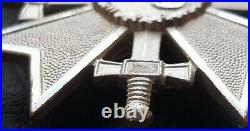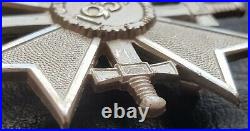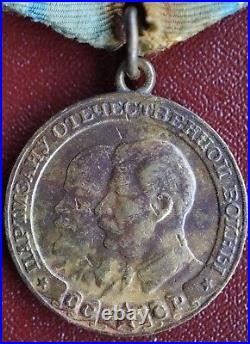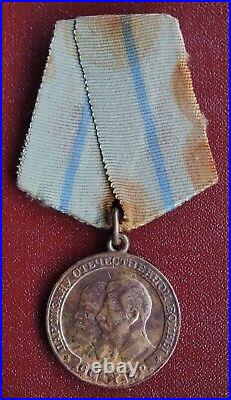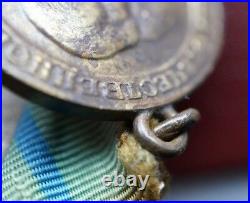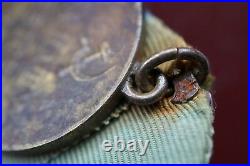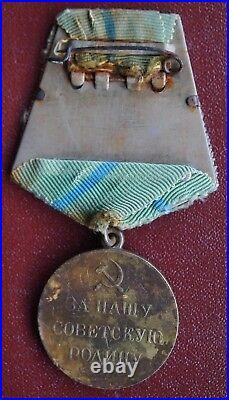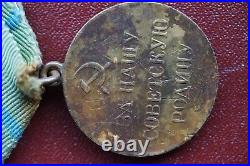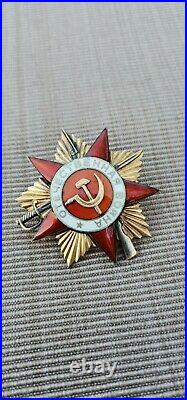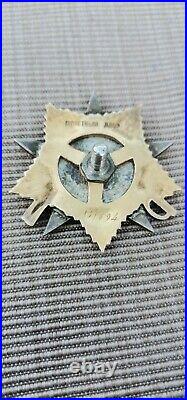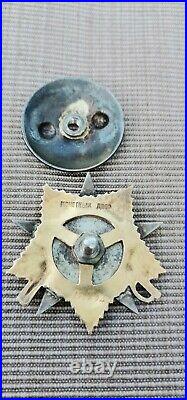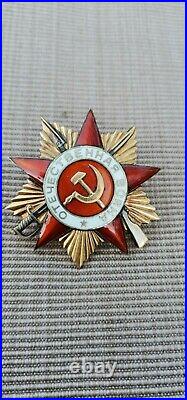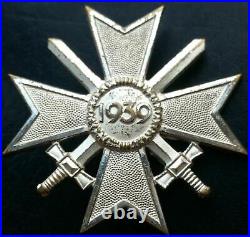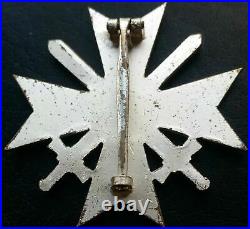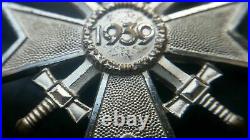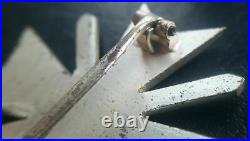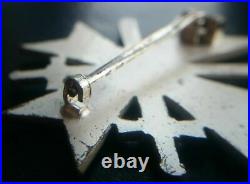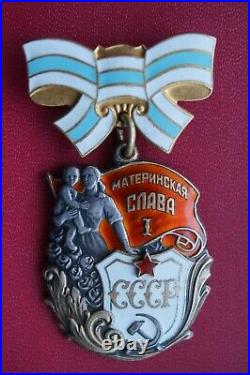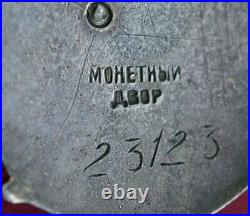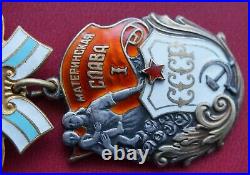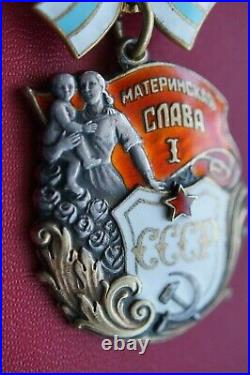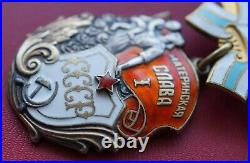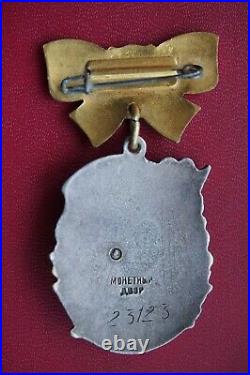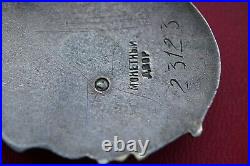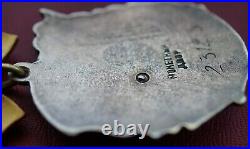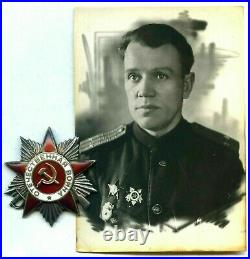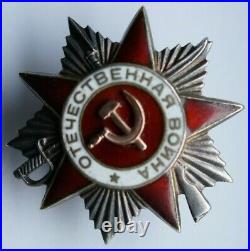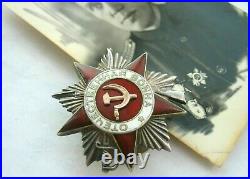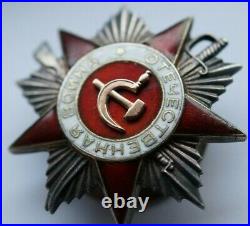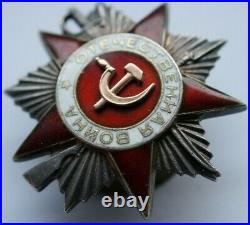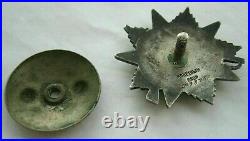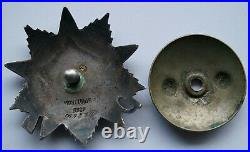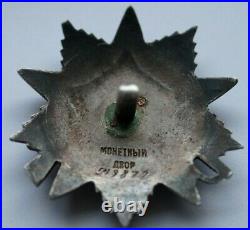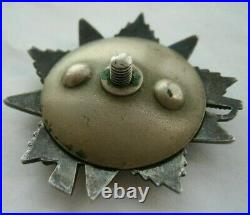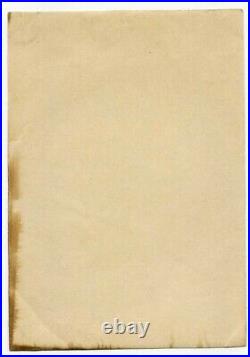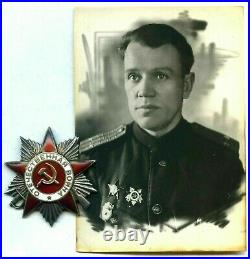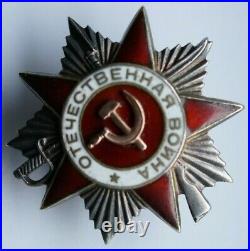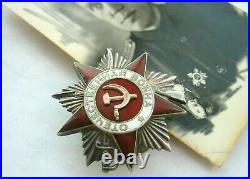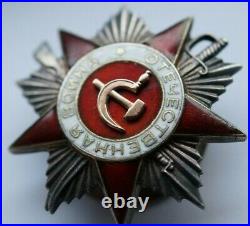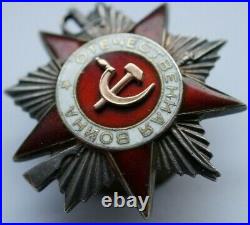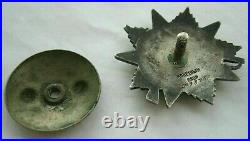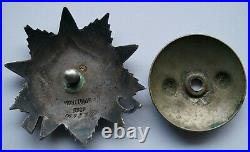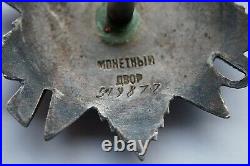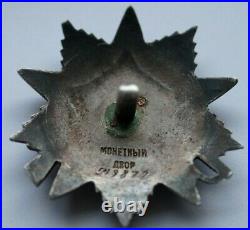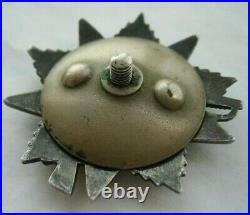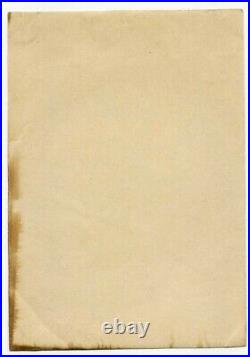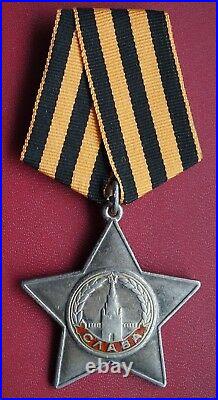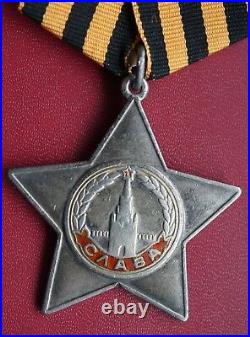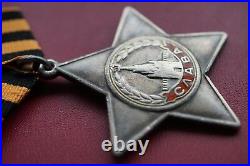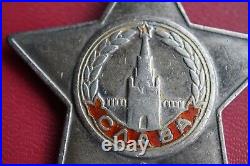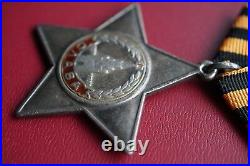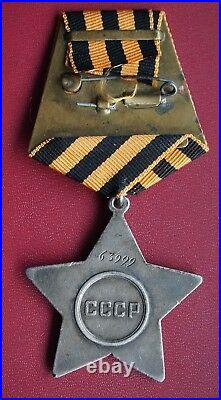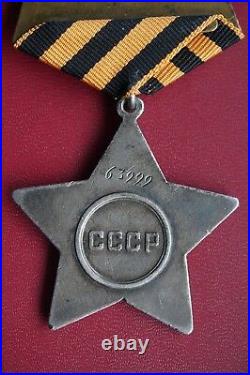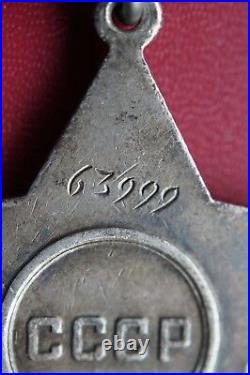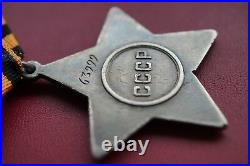- Era: 1945-Present
- Country/ Organization: Germany
- Country/Region of Manufacture: Germany
- Theme: Militaria
- Conflict: World War II (1939-1945)
- Service: Army
- Type: Medals & Ribbons
Posts tagged class
Original German War Merit Cross First Class With Swords (Kriegsverdienstkreuz mit Schwertern) / post WW2 version (1957 pattern) – no swastika, VERY RARE DEUMER MADE TWO PIECE EXAMPLE, MARKED “3″, VERY NICE CONDITION – PERFECT PIN DEVICE, MINT EXAMPLE, HARD TO FIND. In 1957 the West German government authorised replacement Iron Crosses with an Oak Leaf Cluster in place of the swastika, similar to the Iron Crosses of 1813, 1870, and 1914, which could be worn by World War II Iron Cross recipients. The 1957 law also authorised de-Nazified versions of most other World War II-era decorations (except those specifically associated with Nazi Party organizations, such as SS Long Service medals, or with the expansion of the German Reich, such as the medals for the annexation of Austria, the Sudetenland, and the Memel region). The main government contract to manufacture and supply these new de-nazified WW2 1957 official decorations went to the world famous German firm Steinhauer & Lueck, Luedenscheid Germany. Knights Crosses, Iron Crosses, Wound Badges, Tank Assault Badges etc were re-designed by Steinhauer & Lück – often with the oak-leaf spray replacing the swastika, with S&L having the sole patent rights to all WW2 1957 German decorations. S&L did not have the whole monopoly on medal making, other famous firms such as Deschler & Sohn, BH Maher and Juncker also manufactured these new German decorations. Lüdenscheid is situated between the cities Dortmund and Bonn. It was here that one of the youngest medal firms was founded in 1889 by August Steinhauer and Gustav Adolf Lück. The first production began in a cellar, the customer base continued to increase. A property was bought at 51 Hochstrasse which is still home for this famous company today. During WW2 Steinhauer & Lück produced medals and badges, like the famous Knights Cross and many other types of medals and badges. In 1957 this company was awarded the contract to produce all the newly re-designed legal WW2 1957 de-nazified decorations, plus the contract to manufacture all of Germany’s official decorations including Germany’s highest order the Bundesverdienstkreuz. Only a very limited number of original WW2 1957 medals are still produced, mainly Iron Crosses, German Cross Gold & Silver & Wound Badges and are considered 100% genuine by the German Government. HISTORY OF THE AWARD. The War Merit Cross (Kriegsverdienstkreuz) and War Merit Medal (Kriegsverdienstmedaille) was a decoration of Nazi Germany during the Second World War, which could be awarded to civilians as well as military personnel. It was reissued in 1957 by the Bundeswehr in a De-Nazified version for veterans. This award was created by Adolf Hitler in 1939 as a successor to the non-combatant Iron Cross which was used in earlier wars (same medal but with a different ribbon). The award was graded the same as the Iron Cross: War Merit Cross Second Class, War Merit Cross First Class, and Knights Cross of the War Merit Cross. The award had two variants: with swords given to soldiers for exceptional service in battle above and beyond the call of duty (but not worthy of an Iron Cross which was more a bravery award), and without swords for meritorious service behind the lines which could also be awarded to civilians. Recipients had to have the lower grade of the award before getting the next level. There was also another version below the 2nd class simply called the War Merit Medal (German: Kriegsverdienstmedaille), set up in 1940 for civilians in order to offset the large number of 2nd class without swords being awarded. It was usually given to those workers in factories who significantly exceeded work quotas. One notable winner of the War Merit Cross was William Joyce (aka Lord Haw-Haw) who received both the second and first class, both without swords. Recipients of the Knights Cross of the War Merit Cross customarily received the medal from holders of the Knights Cross of the Iron Cross, to symbolize the link between the combat soldier and their supporters, who helped maintain the war effort. There was one extra grade of the War Merit Cross, which was created at the suggestion of Albert Speer: The Knights Cross of the War Merit Cross in Gold, but this was never officially placed on the list of national awards as it came about in 1945 and there was no time to officially promulgate the award before the war ended. The Knights Cross of the War Merit Cross in Gold (without swords) was awarded’on paper’ to two recipients on 20 April 1945: Franz Hahne and Karl-Otto Saur. The ribbon of the War Merit Cross was in red-white-black-white-red; that was, the red and black colors being reversed from the ribbon of the World War II version of the Iron Cross. The ribbon for the War Merit Medal was similar, but with a narrow red vertical red strip in the center of the black field. Soldiers who earned the War Merit Cross 2nd Class with Swords wore a small crossed-swords device on the ribbon. The War Merit Cross 1st Class was a pin-backed medal worn on the pocket of the tunic (like the Iron Cross 1st Class). The ribbon of the War Merit Cross 2nd Class could be worn like the ribbon of the Iron Cross 2nd Class (through the third buttonhole). Combat soldiers tended to hold the War Merit Cross in low regard, referring to its wearers as being in’Iron Cross Training’, and prior to 28 September 1941, the War Merit Cross could not be worn with a corresponding grade of the Iron Cross, which took precedence. A total of 118 awards of the Knights Cross of the War Merit Cross with swords, and 137 awards of the Knights Cross of the War Merit Cross without swords were awarded. Considering the relative rarity of the award compared with the grades of the Knights Cross of the Iron Cross, it took on extra meaning. For example, Reichsmarschall Hermann Göring made a concerted effort to get Hitler to award him this order, much to Hitler’s annoyance. In response, Hitler outlined a series of criteria governing the awarding of this decoration and the philosophy of such awards, and directed that “prominent party comrades” were not to be awarded with the Knights Cross of the War Merit Cross (or similar decorations), and withdrew the proposed awards of this order to Gauleiter Erich Koch and State Secretary Karl Hanke. Directing his comments at Göring personally, Hitler ordered that such attempts to gain this award be stopped (from a letter dated 27 August 1943 from Führerhauptquartier). Also, the scarcity of the award of the Knights Cross of the War Merit Cross compared with the Kinghts Cross of the Iron Cross gave it an “air of exclusiveness” it did not really deserve, as it ranked below the Knights Cross of the Iron Cross. Six persons received two Knights Cross’ of the War Merit Cross (one with Swords and one without Swords): Walter Brugmann, Julius Dorpmuller, Karl-Otto Saur, Albin Sawatzki, Walter Schreiber, and Walter Rohlandt. This item is in the category “Collectables\Militaria\World War II (1939-1945)\Medals/ Ribbons”. The seller is “a..anderson” and is located in this country: GB. This item can be shipped worldwide.
RARE ORIGINAL Soviet – USSR. Order of Labour Glory – III class. On the Reverse there are Two Rivets Holding the Patch Hammer and Sickle. Silver and it shows a very attractive patina! Nice condition -Actual pictures. This item is in the category “Collectables\Militaria\World War II (1939-1945)\Medals/ Ribbons”. The seller is “e.fom77″ and is located in this country: GB. This item can be shipped worldwide.
- Modified Item: No
- Country/ Organization: Russia
- Era: 1945-Present
Original German post WW2 / 1957 pattern War Merit Cross First Class (Kriegsverdienstkreuz), IN VERY NICE CONDITION WITH PERFECT PIN DEVICE, ST&L (STEINHAUER & LUECK) MADE EXAMPLE LATER WITH OPEN HINGE BLOCK, A REALLY GOOD PIECE. FEW FACTS ABOUT THE GERMAN 1957 PATTERN AWARDS. In 1957 the West German government authorised replacement Iron Crosses with an Oak Leaf Cluster in place of the swastika, similar to the Iron Crosses of 1813, 1870, and 1914, which could be worn by World War II Iron Cross recipients. The 1957 law also authorised de-Nazified versions of most other World War II-era decorations (except those specifically associated with Nazi Party organizations, such as SS Long Service medals, or with the expansion of the German Reich, such as the medals for the annexation of Austria, the Sudetenland, and the Memel region). The main government contract to manufacture and supply these new de-nazified WW2 1957 official decorations went to the world famous German firm Steinhauer & Lueck, Luedenscheid Germany. Knights Crosses, Iron Crosses, Wound Badges, Tank Assault Badges etc were re-designed by Steinhauer & Lück – often with the oak-leaf spray replacing the swastika, with S&L having the sole patent rights to all WW2 1957 German decorations. S&L did not have the whole monopoly on medal making, other famous firms such as Deschler & Sohn, BH Maher and Juncker also manufactured these new German decorations. Lüdenscheid is situated between the cities Dortmund and Bonn. It was here that one of the youngest medal firms was founded in 1889 by August Steinhauer and Gustav Adolf Lück. The first production began in a cellar, the customer base continued to increase. A property was bought at 51 Hochstrasse which is still home for this famous company today. During WW2 Steinhauer & Lück produced medals and badges, like the famous Knights Cross and many other types of medals and badges. In 1957 this company was awarded the contract to produce all the newly re-designed legal WW2 1957 de-nazified decorations, plus the contract to manufacture all of Germany’s official decorations including Germany’s highest order the Bundesverdienstkreuz. Only a very limited number of original WW2 1957 medals are still produced, mainly Iron Crosses, German Cross Gold & Silver & Wound Badges and are considered 100% genuine by the German Government. HISTORY OF THE AWARD. The War Merit Cross (Kriegsverdienstkreuz) and War Merit Medal (Kriegsverdienstmedaille) was a decoration of Nazi Germany during the Second World War, which could be awarded to civilians as well as military personnel. It was reissued in 1957 by the Bundeswehr in a De-Nazified version for veterans. This award was created by Adolf Hitler in 1939 as a successor to the non-combatant Iron Cross which was used in earlier wars (same medal but with a different ribbon). The award was graded the same as the Iron Cross: War Merit Cross Second Class, War Merit Cross First Class, and Knights Cross of the War Merit Cross. The award had two variants: with swords given to soldiers for exceptional service in battle above and beyond the call of duty (but not worthy of an Iron Cross which was more a bravery award), and without swords for meritorious service behind the lines which could also be awarded to civilians. Recipients had to have the lower grade of the award before getting the next level. There was also another version below the 2nd class simply called the War Merit Medal (German: Kriegsverdienstmedaille), set up in 1940 for civilians in order to offset the large number of 2nd class without swords being awarded. It was usually given to those workers in factories who significantly exceeded work quotas. One notable winner of the War Merit Cross was William Joyce (aka Lord Haw-Haw) who received both the second and first class, both without swords. Recipients of the Knights Cross of the War Merit Cross customarily received the medal from holders of the Knights Cross of the Iron Cross, to symbolize the link between the combat soldier and their supporters, who helped maintain the war effort. There was one extra grade of the War Merit Cross, which was created at the suggestion of Albert Speer: The Knights Cross of the War Merit Cross in Gold, but this was never officially placed on the list of national awards as it came about in 1945 and there was no time to officially promulgate the award before the war ended. The Knights Cross of the War Merit Cross in Gold (without swords) was awarded’on paper’ to two recipients on 20 April 1945: Franz Hahne and Karl-Otto Saur. The ribbon of the War Merit Cross was in red-white-black-white-red; that was, the red and black colors being reversed from the ribbon of the World War II version of the Iron Cross. The ribbon for the War Merit Medal was similar, but with a narrow red vertical red strip in the center of the black field. Soldiers who earned the War Merit Cross 2nd Class with Swords wore a small crossed-swords device on the ribbon. The War Merit Cross 1st Class was a pin-backed medal worn on the pocket of the tunic (like the Iron Cross 1st Class). The ribbon of the War Merit Cross 2nd Class could be worn like the ribbon of the Iron Cross 2nd Class (through the third buttonhole). Combat soldiers tended to hold the War Merit Cross in low regard, referring to its wearers as being in’Iron Cross Training’, and prior to 28 September 1941, the War Merit Cross could not be worn with a corresponding grade of the Iron Cross, which took precedence. A total of 118 awards of the Knights Cross of the War Merit Cross with swords, and 137 awards of the Knights Cross of the War Merit Cross without swords were awarded. Considering the relative rarity of the award compared with the grades of the Knights Cross of the Iron Cross, it took on extra meaning. For example, Reichsmarschall Hermann Göring made a concerted effort to get Hitler to award him this order, much to Hitler’s annoyance. In response, Hitler outlined a series of criteria governing the awarding of this decoration and the philosophy of such awards, and directed that “prominent party comrades” were not to be awarded with the Knights Cross of the War Merit Cross (or similar decorations), and withdrew the proposed awards of this order to Gauleiter Erich Koch and State Secretary Karl Hanke. Directing his comments at Göring personally, Hitler ordered that such attempts to gain this award be stopped (from a letter dated 27 August 1943 from Führerhauptquartier). Also, the scarcity of the award of the Knights Cross of the War Merit Cross compared with the Kinghts Cross of the Iron Cross gave it an “air of exclusiveness” it did not really deserve, as it ranked below the Knights Cross of the Iron Cross. Six persons received two Knights Cross’ of the War Merit Cross (one with Swords and one without Swords): Walter Brugmann, Julius Dorpmuller, Karl-Otto Saur, Albin Sawatzki, Walter Schreiber, and Walter Rohlandt. This item is in the category “Collectables\Militaria\World War II (1939-1945)\Medals/ Ribbons”. The seller is “a..anderson” and is located in this country: GB. This item can be shipped worldwide.
- Country/Region of Manufacture: Germany
- Country/ Organization: Germany
- Theme: Militaria
- Type: Medals & Ribbons
- Conflict: World War II (1939-1945)
- Service: Army
- Era: 1945-Present
USSR Soviet Russian Order – MEDAL – Soviet Russian USSR WWII – Medal Partisan of the Patriotic War 2nd class. 100% Authentic & Good condition!! This item is in the category “Collectables\Militaria\World War II (1939-1945)\Medals/ Ribbons”. The seller is “e.fom77″ and is located in this country: GB. This item can be shipped worldwide.
- Country/ Organization: Russia
- Era: 1945-Present
Original USSR Russian WW II period order of Patriotic War, first class type 2, combat period 1943, gold. Marked on the back with one line : Mint???????? Distance between 14k gold connections 4mm. This item is in the category “Collectables\Militaria\World War II (1939-1945)\Medals/ Ribbons”. The seller is “esp2021″ and is located in this country: GB. This item can be shipped worldwide.
- Type: Medals & Ribbons
- Issued/ Not-Issued: Issued
- Conflict: World War II (1939-1945)
- Service: Army
Original German War Merit Cross First Class Kriegsverdienstkreuz / post WW2 version (1957 pattern) – no swastika, NICE WORN CONDITION – WORKING PIN DEVICE, EARLY ST&L (STEINHAUER & LUCK) EXAMPLE – REALLY NICE WORN MEDAL FROM THE MID 60′S. In 1957 the West German government authorised replacement Iron Crosses with an Oak Leaf Cluster in place of the swastika, similar to the Iron Crosses of 1813, 1870, and 1914, which could be worn by World War II Iron Cross recipients. The 1957 law also authorised de-Nazified versions of most other World War II-era decorations (except those specifically associated with Nazi Party organizations, such as SS Long Service medals, or with the expansion of the German Reich, such as the medals for the annexation of Austria, the Sudetenland, and the Memel region). The main government contract to manufacture and supply these new de-nazified WW2 1957 official decorations went to the world famous German firm Steinhauer & Lueck, Luedenscheid Germany. Knights Crosses, Iron Crosses, Wound Badges, Tank Assault Badges etc were re-designed by Steinhauer & Lück – often with the oak-leaf spray replacing the swastika, with S&L having the sole patent rights to all WW2 1957 German decorations. S&L did not have the whole monopoly on medal making, other famous firms such as Deschler & Sohn, BH Maher and Juncker also manufactured these new German decorations. Lüdenscheid is situated between the cities Dortmund and Bonn. It was here that one of the youngest medal firms was founded in 1889 by August Steinhauer and Gustav Adolf Lück. The first production began in a cellar, the customer base continued to increase. A property was bought at 51 Hochstrasse which is still home for this famous company today. During WW2 Steinhauer & Lück produced medals and badges, like the famous Knights Cross and many other types of medals and badges. In 1957 this company was awarded the contract to produce all the newly re-designed legal WW2 1957 de-nazified decorations, plus the contract to manufacture all of Germany’s official decorations including Germany’s highest order the Bundesverdienstkreuz. Only a very limited number of original WW2 1957 medals are still produced, mainly Iron Crosses, German Cross Gold & Silver & Wound Badges and are considered 100% genuine by the German Government. HISTORY OF THE AWARD. The War Merit Cross (Kriegsverdienstkreuz) and War Merit Medal (Kriegsverdienstmedaille) was a decoration of Nazi Germany during the Second World War, which could be awarded to civilians as well as military personnel. It was reissued in 1957 by the Bundeswehr in a De-Nazified version for veterans. This award was created by Adolf Hitler in 1939 as a successor to the non-combatant Iron Cross which was used in earlier wars (same medal but with a different ribbon). The award was graded the same as the Iron Cross: War Merit Cross Second Class, War Merit Cross First Class, and Knights Cross of the War Merit Cross. The award had two variants: with swords given to soldiers for exceptional service in battle above and beyond the call of duty (but not worthy of an Iron Cross which was more a bravery award), and without swords for meritorious service behind the lines which could also be awarded to civilians. Recipients had to have the lower grade of the award before getting the next level. There was also another version below the 2nd class simply called the War Merit Medal (German: Kriegsverdienstmedaille), set up in 1940 for civilians in order to offset the large number of 2nd class without swords being awarded. It was usually given to those workers in factories who significantly exceeded work quotas. One notable winner of the War Merit Cross was William Joyce (aka Lord Haw-Haw) who received both the second and first class, both without swords. Recipients of the Knights Cross of the War Merit Cross customarily received the medal from holders of the Knights Cross of the Iron Cross, to symbolize the link between the combat soldier and their supporters, who helped maintain the war effort. There was one extra grade of the War Merit Cross, which was created at the suggestion of Albert Speer: The Knights Cross of the War Merit Cross in Gold, but this was never officially placed on the list of national awards as it came about in 1945 and there was no time to officially promulgate the award before the war ended. The Knights Cross of the War Merit Cross in Gold (without swords) was awarded’on paper’ to two recipients on 20 April 1945: Franz Hahne and Karl-Otto Saur. The ribbon of the War Merit Cross was in red-white-black-white-red; that was, the red and black colors being reversed from the ribbon of the World War II version of the Iron Cross. The ribbon for the War Merit Medal was similar, but with a narrow red vertical red strip in the center of the black field. Soldiers who earned the War Merit Cross 2nd Class with Swords wore a small crossed-swords device on the ribbon. The War Merit Cross 1st Class was a pin-backed medal worn on the pocket of the tunic (like the Iron Cross 1st Class). The ribbon of the War Merit Cross 2nd Class could be worn like the ribbon of the Iron Cross 2nd Class (through the third buttonhole). Combat soldiers tended to hold the War Merit Cross in low regard, referring to its wearers as being in’Iron Cross Training’, and prior to 28 September 1941, the War Merit Cross could not be worn with a corresponding grade of the Iron Cross, which took precedence. A total of 118 awards of the Knights Cross of the War Merit Cross with swords, and 137 awards of the Knights Cross of the War Merit Cross without swords were awarded. Considering the relative rarity of the award compared with the grades of the Knights Cross of the Iron Cross, it took on extra meaning. For example, Reichsmarschall Hermann Göring made a concerted effort to get Hitler to award him this order, much to Hitler’s annoyance. In response, Hitler outlined a series of criteria governing the awarding of this decoration and the philosophy of such awards, and directed that “prominent party comrades” were not to be awarded with the Knights Cross of the War Merit Cross (or similar decorations), and withdrew the proposed awards of this order to Gauleiter Erich Koch and State Secretary Karl Hanke. Directing his comments at Göring personally, Hitler ordered that such attempts to gain this award be stopped (from a letter dated 27 August 1943 from Führerhauptquartier). Also, the scarcity of the award of the Knights Cross of the War Merit Cross compared with the Kinghts Cross of the Iron Cross gave it an “air of exclusiveness” it did not really deserve, as it ranked below the Knights Cross of the Iron Cross. Six persons received two Knights Cross’ of the War Merit Cross (one with Swords and one without Swords): Walter Brugmann, Julius Dorpmuller, Karl-Otto Saur, Albin Sawatzki, Walter Schreiber, and Walter Rohlandt. This item is in the category “Collectables\Militaria\World War II (1939-1945)\Medals/ Ribbons”. The seller is “a..anderson” and is located in this country: GB. This item can be shipped worldwide.
- Era: 1945-Present
- Country/ Organization: Germany
- Country/Region of Manufacture: Germany
- Theme: Militaria
- Conflict: World War II (1939-1945)
- Service: Army
- Type: Medals & Ribbons
USSR Soviet Russian Order – MEDAL. USSR – RARE Soviet Russian Order of the Mother’s Glory I Class – RARE- VERY LOW NUMBERE? Excellent condition & 100% Authentic!! This is a BEAUTIFUL 1st Class’Order of Maternal Glory’ Medal – Serial No:23123!! The medallion is in silver gilt and enamels; suspension device is in gilded brass and enamels. The Order of Maternal Glory Russian:????? Was a Soviet civilian award created on 8 July 1944 by Joseph Stalin. It was established with a decision of the Presidium of Supreme Soviet of the USSR. Its status was confirmed by the Soviet’s decision of 18 August 1944 and later modified by September 16, 1947, May 28, 1973, and May 28, 1980 decisions. It was awarded on behalf of the Presidium of Supreme Soviet of the USSR through decrees of local Soviet presidencies. The order was divided into three classes: 1st, 2nd and 3rd class. It was conferred to. Mothers bearing and raising 9 children. Mothers bearing and raising 8 children. Mothers bearing and raising 7 children. The order was conferred upon the first birthday of the last child, provided that the other children necessary to reach the qualifying number (natural or adopted) remained alive. Children who had perished under heroic, military or other respectful circumstances, including occupational diseases, were also counted. The award was created simultaneously with the Mother Heroine order and the Maternity Medal Russian:?????? And it was situated in between them. The author of the art project was the painter Goznaka. The first decree for bestowing the award was issued on December 6, 1944, when the first class order was conferred to 21 women, the 2nd class to 26 and the 3rd one to 27. In total the order was awarded in the 1st class to 753,000 people, 1,508,000 received the 2nd class award and 2,786,000 received the 3rd class award. This item is in the category “Collectables\Militaria\World War II (1939-1945)\Medals/ Ribbons”. The seller is “e.fom77″ and is located in this country: GB. This item can be shipped worldwide.
- Country/ Organization: Russia
- Conflict: World War II (1939-1945)
USSR Soviet Russian – MEDAL. RARE WWII WW2 Soviet Russia. Original Award 1944 ORDER Patriotic War 2nd class? Perfect collection quality. The award is made of silver, sickle and hammer in the center are made of Gold 585, weight about 0.5 gr. Total weight 26.05 gramsThe original old photo of the 1940s – officer, lieutenant colonel of the Red Army with the Order of the Patriotic War of the 2nd class. 100% Authentic & Excellent Condition!! This item is in the category “Collectables\Militaria\World War II (1939-1945)\Medals/ Ribbons”. The seller is “e.fo805″ and is located in this country: GB. This item can be shipped worldwide.
- Type: Medals & Ribbons
USSR Soviet Russian – MEDAL. RARE WWII WW2 Soviet Russia. Original Award 1944 ORDER Patriotic War 2nd class? Perfect collection quality. The award is made of silver, sickle and hammer in the center are made of Gold 585, weight about 0.5 gr. Total weight 26.05 gramsThe original old photo of the 1940s – officer, lieutenant colonel of the Red Army with the Order of the Patriotic War of the 2nd class. 100% Authentic & Excellent Condition!! This item is in the category “Collectables\Militaria\World War II (1939-1945)\Medals/ Ribbons”. The seller is “e.fo805″ and is located in this country: GB. This item can be shipped worldwide.
- Type: Medals & Ribbons
USSR – Soviet Russian Order -Medal – Badge. ORIGINAL – USSR Soviet Russian Order of Glory 3rd Class SILVER – VERY – VERY LOW NUMBERED -? The order is in near mint condition with all details crisp and it shows a very attractive patina. 100% Authentic & Excellent condition!! This item is in the category “Collectables\Militaria\World War II (1939-1945)\Medals/ Ribbons”. The seller is “e.fom77″ and is located in this country: GB. This item can be shipped worldwide.
- Country/ Organization: Russia
